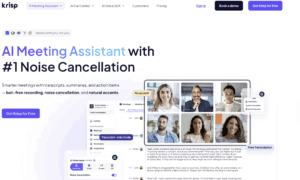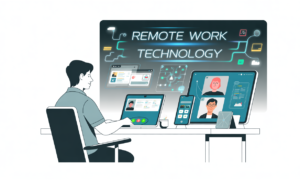As Generation Z enters the workforce, their expectations are shaking up traditional work practices. Gen Z craves an experience that combines professionalism with flexibility, and they’re pushing for technology that supports these values. This generation is tech-savvy, raised on instant access to information and digital connections, and they expect their work tools to reflect that. Here’s how companies can meet Gen Z’s unique demands for technology in remote work.
prioritising on-demand access to knowledge and resources
Gen Z grew up in a world where answers are a Google search away, and they expect the same ease of access to knowledge at work. For them, relying on emails or clunky databases to find information is frustrating and slows down their productivity.
- AI-powered knowledge bases: Companies can support Gen Z’s need for speed by using AI-driven knowledge management platforms. Systems like Notion or Confluence help them access guidelines, workflows, and project details instantly, creating a smooth, self-directed work experience.
- On-demand learning platforms: Continuous learning is a major priority for Gen Z, and they prefer learning that can happen in their own time. Platforms like LinkedIn Learning or Udemy offer courses tailored to various skills, making it easier for them to upskill without formal training sessions.
embracing flexible, mobile-first solutions
Gen Z’s demand for flexibility doesn’t just mean flexible hours — it also means they want to work on their terms, from any device. Many from this generation don’t believe work needs to be done solely on a desktop in a dedicated workspace. They want tools that allow them to be just as productive on their mobile or tablet, allowing them to work wherever inspiration strikes.
- Mobile-friendly platforms: Tools like Slack, Microsoft Teams, and Asana all have strong mobile applications that let Gen Z keep up with projects, conversations, and updates on the go.
- Cloud-based document collaboration: Gen Z workers expect to access and work on documents from anywhere. Tools like Google Workspace or Microsoft 365 ensure that files are available on any device and allow for real-time collaboration with team members.
enabling professional growth through tech-driven feedback
Feedback is critical to Gen Z’s professional development. They’re eager for continuous improvement and want access to technology that supports regular feedback loops and transparent performance tracking. They don’t see feedback as a yearly conversation — they want it in real time and in formats that feel constructive and actionable.
- Performance-tracking tools: Many Gen Z workers appreciate tools like 15Five or Lattice, which provide goal tracking, self-evaluation options, and frequent feedback. These platforms allow managers and employees to engage in ongoing conversations about performance and development.
- Transparent project management: Project management tools with built-in analytics, like Monday.com or Asana, can provide transparency and help Gen Z employees understand how their contributions are impacting the bigger picture.
integrating asynchronous work tools for true flexibility
For Gen Z, flexibility isn’t only about working from home — it’s also about having control over when they work best. They often value tools that support asynchronous work, allowing them to set their own pace without waiting on team members or feeling pressured to be online at certain times.
- Video recordings and summaries: Tools like Loom allow team members to record updates or presentations that others can watch on their own time. This is particularly useful for global teams where time zones don’t always align.
- Project boards and visual timelines: Asynchronous work thrives when everyone is clear on what needs to be done and by when. Visual project boards and timelines, available on platforms like Trello or Notion, help Gen Z employees manage their work independently and keep projects on track without micromanagement.
supporting productivity with mental health tools
Gen Z is vocal about mental health and understands the impact of burnout on productivity. They’re looking for companies that integrate wellbeing tools into their tech stack, providing ways to manage stress and avoid digital fatigue.
- Digital wellbeing tools: Apps like Headspace for meditation, or simple focus timers like Focus Booster, give Gen Z workers tools to manage their mental health throughout the workday.
- Encouraging regular breaks: Teams can use tools like Pomodoro timers that promote short, scheduled breaks during tasks to help maintain energy and avoid burnout. These solutions appeal to Gen Z’s understanding of balanced productivity.
creating personalised workspaces for professionalism and individuality
Gen Z wants to feel like they can bring their full self to work, even remotely. They’re looking for tech solutions that allow them to tailor their workspaces, both digitally and physically, in ways that feel authentic yet professional.
- Virtual workspace customisation: Gen Z workers often prefer apps that allow them to personalise their virtual workspace. Platforms like Microsoft Teams and Slack, with custom notification settings and themed backgrounds, allow employees to create a virtual space that reflects their personality while maintaining professionalism.
- Tech stipends for ergonomic setups: Many Gen Z professionals appreciate stipends to upgrade their work environment. This might include reimbursement for ergonomic desks or high-quality headphones, showing that the company cares about their comfort and productivity.
building a culture of inclusion with diversity-driven tools
Gen Z highly values diversity and inclusion. They want companies that take these values seriously and use technology to create an inclusive work environment where all voices are heard.
- Anonymous feedback channels: Platforms like Officevibe or even an anonymous Google Form allow Gen Z workers to express concerns or share ideas without fear of judgement.
- Collaboration platforms with language support: Working across cultures and languages is becoming more common, and Gen Z expects companies to support diverse teams. Tools like Google Meet with live captioning, or translation options in Slack, ensure that no one is excluded based on language.
the future is here
Gen Z’s tech demands reflect their values: professionalism, flexibility, personal growth, mental health, and inclusion. They expect remote work setups that support these priorities and are pushing companies to use tech in a way that feels truly supportive, adaptable, and transparent. For businesses, meeting these demands isn’t just about staying relevant; it’s about creating an environment where Gen Z employees can thrive and contribute fully to the future of work.



































